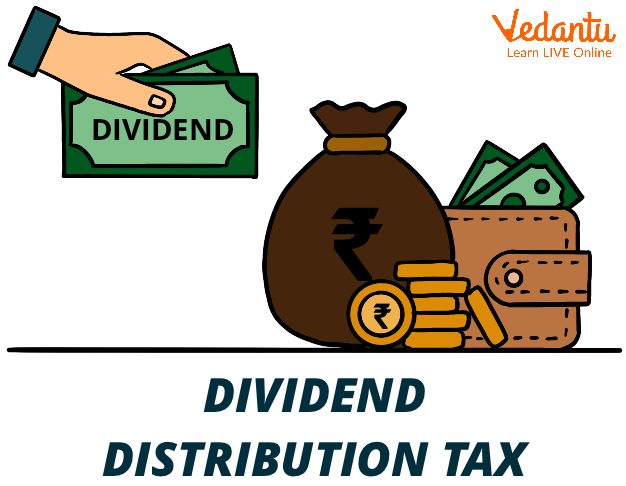




What is Dividend Distribution Tax?
When a corporation pays out dividends, it shares some of its financial success with its shareholders. Profits delivered to investors or shareholders are subject to a tax known as a dividend distributions tax. While paying income tax on dividend income, a firm must pay income tax by the terms of the Income Tax Act.

Defining the Meaning of DDT
DDT must be paid within fourteen days after the earliest of the below occurrences by the terms of the income tax act:
Payment of dividends
Distributions
Dividend Payment
If the treatment of tax and dividend is not done by the deadline, the 1% interest per month, or a fraction thereof, will be added to the total. Interest would be accrued from the day after the last such tax was due until the day it is paid. With the Finance Act of 2020, the dividend is now taxable to the unitholder. They will have to pay taxes on their money at their rate. Any unitholder participating in the dividend scheme will face this situation.
Learning Whether the Dividend is Taxable or Not
A dividend is a money you get from owning shares or mutual funds. Dividends are a common way for stock and mutual fund holders to collect their returns. Some may wonder if the dividends you get will be subject to taxation in your own right, given that they are considered income. The dividend recipient's tax status will be affected by whether or not they trade or invest in securities. An individual's earnings from trade operations are subject to taxation as business income.
As a result, dividend income should be reported as business income when the securities are retained for commercial reasons. As opposed, dividend income is taxable under the "other sources of income" category when shares are held for investment purposes.
Suppose the dividend is considered business income for tax purposes. In that case, the assessee is entitled to a deduction for any costs necessary to generate the dividend income, such as interest on loans and collection fees. Contrarily, when the dividend falls under the category of "income derived from other sources," the assessee can only deduct that interest expense expended to generate that 20% of overall dividend income. Commissions or other payments made to a banker or any other individual with the express aim of realising such dividends are not deductible.
Know the Income Tax on Dividend Income

Meaning of Income Tax on Dividend Income
A dividend may be earned by investing in equities or mutual funds. The term "dividend" refers to the profit distributed to shareholders of a company or other investors in a similar scheme. Dividends are company earnings payments to its stockholders (investors).
The following Companies and Organisations provide dividends:
Domestic company – one in which you own shares.
Domestic company – one in which you own shares.
Foreign company - whose stock you have invested in.
Income from dividends would be subject to taxation at the appropriate rate.
Let's go into the details of dividend taxation:
The dividend recipient's tax status depends on whether they are a trader or an owner of stocks.
As "business revenue," the individual's gains from trading are subject to taxation.
Therefore, the dividend is taxable as "income from business or profession" when shares are held for trading activities.
Income received in the manner of dividends from shareholdings as an investment is taxed as "income from other sources."
When the dividend is considered business income, the recipient may and all costs incurred of generating that money, including collection fees, interest payments, and so forth.
Tax charges on dividends are not uniform and depend on the nature of the dividend distribution vehicle and the kind of taxpayer receiving the payment.
Conclusion
Dividends from foreign companies are subject to the taxability of dividend income in India; double taxation might occur if the tips have already been charged in the nation where the foreign firm is based. You may be eligible to apply for double taxation relief during certain times. You are entitled to the reduction between the Indian and the foreign Govt in question. If you can't find a way to agree, you may also seek relief under Section 91 of the Income Tax Act.
FAQs on Tax and Dividend Treatment in Accounting: Explained
1. What is the fundamental accounting treatment for dividends declared by a company?
The fundamental accounting treatment for dividends is that they are considered an appropriation of profit, not a charge against profit (like an expense). This means dividends are distributed to shareholders from the profits that remain after all expenses and taxes have been paid. In the financial statements, this is reflected as a reduction in the 'Surplus' that is part of 'Reserves and Surplus' under Shareholders' Funds on the Balance Sheet.
2. How is dividend income from an Indian company taxed for shareholders in the 2025-26 assessment year?
For the assessment year 2025-26, dividend income is fully taxable in the hands of the shareholder. It is added to the individual's total income under the head 'Income from Other Sources' and taxed at their applicable income tax slab rates. The company paying the dividend is required to deduct Tax Deducted at Source (TDS) at 10% if the total dividend paid to a resident individual shareholder exceeds ₹5,000 in a financial year.
3. What are the essential journal entries passed for the declaration and payment of dividends?
The accounting process for dividends involves two main stages with the following journal entries:
- For Declaration of Dividend: The company debits its accumulated profits. The entry is:
Surplus (in Statement of Profit and Loss) Dr.
To Dividend Payable A/c - For Payment of Dividend: When the dividend is paid to shareholders, the liability is settled. The entry is:
Dividend Payable A/c Dr.
To Bank A/c
4. What is the key difference between an 'Interim Dividend' and a 'Final Dividend' in accounting?
The key difference lies in the timing and authority for declaration.
- A Final Dividend is declared by the shareholders at the company's Annual General Meeting (AGM) after the financial year has ended and the final accounts are prepared.
- An Interim Dividend is declared by the Board of Directors at any time during the financial year, before the final accounts are prepared. It is paid out of the profits earned during the current year up to the date of declaration.
5. Why is a dividend treated as an 'appropriation of profit' and not a 'charge against profit'?
A dividend is an appropriation because it is a discretionary distribution of profits that have already been earned. A 'charge against profit' refers to an expense incurred to generate revenue (e.g., salaries, rent) and must be paid regardless of whether the company makes a profit. In contrast, a dividend payment is a decision on how to use the net profit and is only possible if the company is profitable and has distributable reserves. It is not a cost of running the business.
6. How does the treatment of 'Provision for Tax' differ from the treatment of 'Dividend' in a company's final accounts?
The treatment is fundamentally different. 'Provision for Tax' is an estimated amount of income tax payable on the current year's profit. It is a charge against profit and is debited to the Statement of Profit and Loss before arriving at the 'Profit After Tax'. It is shown as a current liability on the Balance Sheet. In contrast, a 'Dividend' is an appropriation of profit that is decided upon after calculating the 'Profit After Tax'.
7. How does paying a dividend affect a company's financial health, as reflected in its Net Asset Value (NAV)?
Yes, paying a dividend directly impacts a company's Net Asset Value (NAV). When a company pays a cash dividend, it uses its cash reserves to make the payment. This reduces the 'Cash and Cash Equivalents' on the asset side of the Balance Sheet. Simultaneously, it reduces the 'Retained Earnings' or 'Surplus' on the equity and liabilities side. Since NAV (or Book Value) is calculated as Total Assets - Total Liabilities, a decrease in assets with no corresponding decrease in liabilities results in a lower NAV.





































